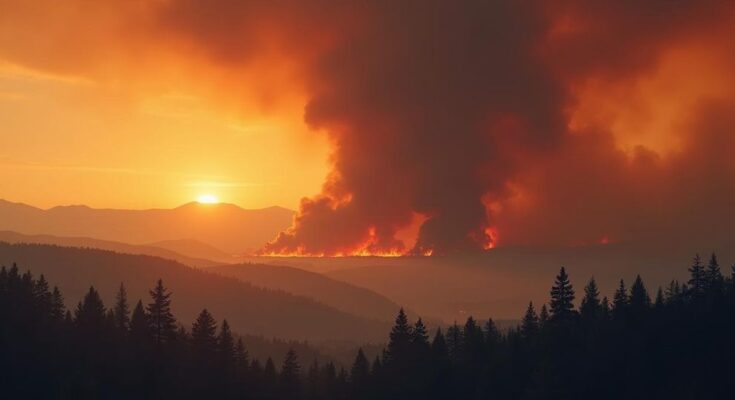Recent wildfires in South America, particularly in the Amazon region, have led to a significant environmental crisis characterized by dense smoke affecting visibility and health. The fires, mainly driven by human activities and compounded by drought and climate change, have resulted in serious health issues for local populations, damage to ecosystems, and threats to indigenous communities. Experts and officials are calling for urgent action to address this growing disaster, highlighting the necessity for a unified global response.
The skies of Rondônia, a vast region in the Amazon rainforest, which is celebrated for its clear and vibrant blue, have recently been obscured by dense smoke resulting from unprecedented wildfires. These man-made blazes stretch across South America, significantly affecting nations including Ecuador, Paraguay, and Brazil. The fires have arisen amidst a historic drought exacerbated by both the El Niño climate phenomenon and the overarching impacts of climate change. In Porto Velho, the capital of Rondônia and home to 500,000 residents, visibility has diminished to the extent that planes have been unable to land, and schools have had to close their doors. Dr. Lilian Samara de Melo Lima, a local physician, has reported a substantial increase in patients suffering from respiratory ailments and other health issues linked to the smoke. With a deep-rooted connection to the region, she expressed her dismay, noting, “This year has been truly atypical,” and attributed the severity of the fires to destructive practices by man that are eradicating the precious rainforests. Marilene Penati, the health secretary of Porto Velho, acknowledged the dire situation, stating, “We’re breathing in so much detritus.” It is evident that the repercussions of these fires extend beyond Brazil, as neighboring countries have also reported significant devastation. Satellite data indicated an alarming surge in fire hotspots across Colombia, Guyana, and Venezuela, revealing the pervasive nature of this crisis. Paraguay’s Chaco ecosystem has been severely threatened, as over 180,000 hectares of land has been reduced to ashes, affecting the indigenous Ayoreo community. In Peru, catastrophic forest fires in both the Andes and Amazon have led to extensive loss of land and at least 20 fatalities since July, prompting the declaration of states of emergency in multiple regions. Prime Minister Gustavo Adrianzén ignited controversy by attributing these fires to traditional farming techniques, while experts asserted that the majority were deliberately ignited to facilitate illicit activities and agricultural expansion. In Ecuador, paramedic Christian Rivera expressed his astonishment at the scale of the emergency, remarking, “I’ve never seen anything like it in 30 years working as a paramedic,” further linking the fires to global warming. The conditions have escalated to national disaster levels in Bolivia, where more than 4.6 million hectares have burned, a figure surpassing the entirety of Switzerland. President Luis Arce’s declaration underscores the severity of the crisis. Health Secretary Penati encapsulated the collective sentiment, stating, “The Earth is sick … the Earth is crying out for help,” a poignant reminder of the urgent need for unified action against this escalating environmental calamity.
The article addresses the ongoing environmental crisis affecting South America, particularly focusing on the spate of wildfires that have ravaged the Amazon rainforest and surrounding ecosystems. These fires are predominantly attributed to human activities, including agricultural expansion and illegal land clearing practices, which are intensified by climate change and natural phenomena like El Niño. The consequence of the fires is multifaceted, encompassing health issues due to smoke inhalation, the devastation of indigenous communities and their land, and wider ecological implications. The urgency of the situation has prompted health officials and scientists to call for immediate collaborative action to mitigate further damage.
The alarming escalation of wildfires across South America illustrates a complex interplay between anthropogenic activities and climate change, with dire impacts on health, ecology, and indigenous communities. Urgent measures are required to address the root causes of these fires and to foster a collective response to the ongoing environmental crisis that affects not just the region but the planet as a whole. As reflected in the words of health secretary Marilene Penati, the Earth is indeed in distress, necessitating immediate and decisive action from all stakeholders involved.
Original Source: www.theguardian.com




